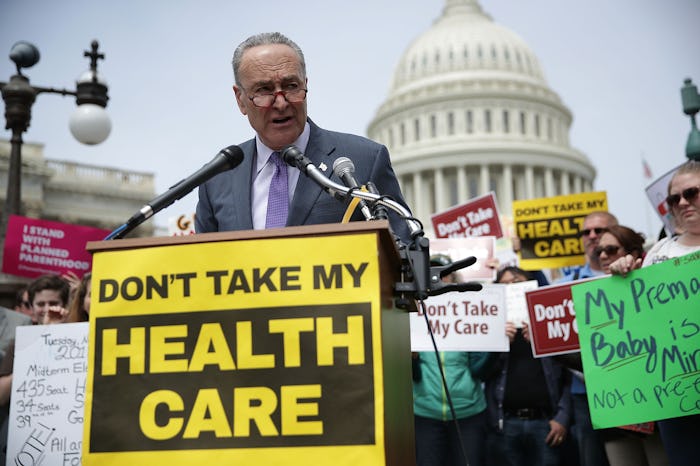News

The AHCA May Not Get A Senate Vote Any Time Soon
President Trump and House Republicans were breaking out the bubbly on Thursday to celebrate what they considered to be a big win. After months of in-fighting, amendments, and failures, it seems they were finally able to squeeze their health care bill through the U.S. House of Representatives. Not to rain on their parade or anything, but they might want to hold off on the celebrations. Because there are still some fairly serious steps to take before the American Health Care Act can be passed. First off, the Senate needs to vote on the AHCA. And the chances of it passing through unscathed are already looking pretty dubious.
The health care bill, which was penned to replace the Obama-era Affordable Health Care Act of 2010, was passed by an incredibly slim margin in the House, 217-213. Speaker of the House Paul Ryan, one of the main forces driving the Obamacare replacement, spoke to reporters on Thursday during a celebratory press conference in the White House Rose Garden, saying:
The American Health Care Act makes health care more affordable. It takes care of our most vulnerable. And it shifts power from Washington back to the states and most importantly, back to you, the patient.
Speaker Ryan failed to mention the 24 million people who would be left without health insurance by 2026 if the AHCA is passed by the Senate, as estimated by the Congressional Budget Office. But he only had, like, three minutes to talk. Priorities.
As for the AHCA's chances in the Senate... they're not looking great. While there is no official timeline at present for the Senate to vote, it will likely take weeks or even a few months for it to get into their hands. Time enough for Congressional Republicans to come up with a more comprehensive bill than the AHCA. Senate Majority Whip John Cornyn told NBC News that the Senate will wait until they believe they have a majority vote before acting.
GOP Sen. Lamar Alexander from Tennessee, who chairs the Health, Education, Labor and Pensions Committee, congratulated House Republicans from the Senate floor moments after the bill was passed. Then he went on to say:
The Senate will carefully review the House bill, and now we’ll go to work on a Senate bill.
Sen. Alexander was clear that he felt the Senate could "get it right," where House Republicans had gotten it wrong. He expressed that the Senate would not impose any "artificial" deadlines and would make sure that they knew how much their bill cost (House Republicans did not reach out to the bipartisan Congressional Budget Office for cost estimates, nor did they hold any hearings about the House bill).
Other senators spoke out in the wake of the House bill's passage as well to voice their concern. Republican Sen. Rob Portman from Ohio released a statement on Thursday about the House bill. He said he supported an Obamacare repeal, but didn't feel the AHCA had met the mark:
I have concerns that this bill does not do enough to protect Ohio’s Medicaid expansion population, especially those who are receiving treatment for heroin and prescription drug use.
Nevada Sen. Dean Heller, also a Republican, took to Twitter to say he felt the bill "fell short."
Senate Republicans are reportedly concerned about any cuts to Medicaid in their respective states under the AHCA. Whether or not they can come up with a bill that better serves the American people remains to be seen, but one thing is certain: They didn't get invited to the party in the Rose Garden. And that had to hurt.